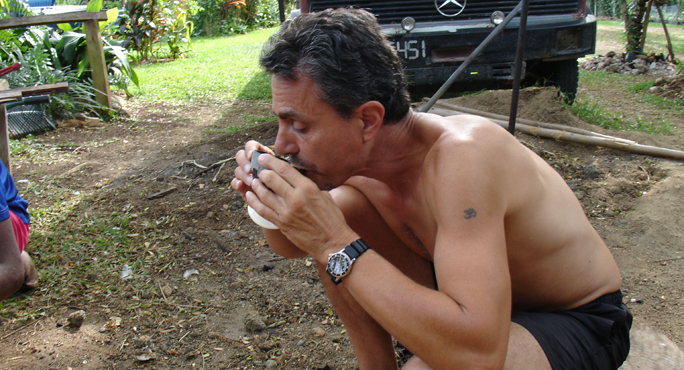Chris drinking Kava
Kava, an herb from the Pacific islands whose roots yield relaxing compounds, has been sold in the U.S. for a long time. In 1900 kava extract appeared in the Sears Roebuck catalog as a “temperance wine,” an alternative to demon drink. Buyers who purchased the extract received a free tea set. Up until the 1950s kava products were registered in the U.S. Pharmacopoeia, the official compilation of approved medicines, for the treatment of both gonorrhea and nervousness.
Captain Cook may have been the first non-native to be offered kava, and he was put off by it. The root of the plant is traditionally ground by native people and mixed with a little water. The mixture is squeezed and strained into a coconut shell and drunk. The feeling of relaxation is immediate and pleasant. Compounds in kava relax tense muscles and work in the amygdala, the anxiety centers of the brain. For Captain Cook, the relaxing native drink looked un-appealing.
“Kava Time” in late afternoon is a regular feature of Pacific island native cultural life, and the use of kava among the people of Oceania goes back at least 3000 years. Non-alcoholic and the color of muddy water, kava is an agent of peace and tranquility. “Kava time” is a daily period of kinship and community, when native people get together, drink kava, and share what has happened in their day. Other visitors to the Pacific islands have taken a more positive approach to kava than Captain Cook and have enjoyed kava time. Pope John Paul drank kava in Fiji, as have British royals and innumerable politicians and diplomats.
In 1996, a kava boom, fueled by features in various news outlets, sent kava sales soaring in both the U.S. and Europe. I wrote a book about kava entitled Kava, Medicine Hunting in Paradise, and hundreds of companies put out kava-based products. Bolstered by several European human clinical studies demonstrating anti-anxiety effects, kava became huge. Sales of kava – “the natural Xanax” – went exponential, and for the first time, many South Pacific island cultures flourished economically due to brisk kava sales.
In 2001, Duke University Medical Center conducted two studies on kava extract. One study showed that kava is safe for the liver, causing no noticeable problems. The other study revealed that kava extract is as effective for the treatment of anxiety as the benzodiazepine class of drugs (Xanax, Valium), without the hazards caused by those medicines.
Out of the blue, one week prior to the publication of the Duke studies, a European-based report declared, contrary to all previous known medical science, that kava had caused liver toxicity in 21 people. Kava sales crashed, insurance companies panicked, European health regulators over-reacted and Pacific islanders were left with their pockets turned out. It took several years, and the dedicated efforts of many medical research teams to establish that the kava liver toxicity report was shoddy and baseless. But the damage to kava was done. To this day, despite absolutely no evidence of liver toxicity among kava drinkers, and despite liver safety demonstrated in medical studies, kava still carries the taint of concerns over liver toxicity.
But the tides are now turning back in kava’s favor. Recently I traveled with my wife Zoe Helene to the epicenter of kava culture, Vanuatu South Pacific, to see what is happening there, and to get ready for the next kava boom, which is surely on the way. In Vanuatu, the origin of kava, I saw vast plantations of mature kava and met with many traders who are readying for kava’s resurgence. Given repeated studies showing that kava is not liver toxic, and considering that many studies show kava to be a profoundly beneficial anti-anxiety aide, the market tides are steadily shifting back in favor of the natural tranquility-promoting herb.
There are more than 100 varieties of kava. Every variety produces a slightly different effect, and during the intervening time between the kava crash and now, large plantations of ‘noble’ kava have sprung up, thereby ensuring that the best types of kava will be super-abundant when kava sales increase, as they are already starting to do. Kava extraction technology has also advanced, and we can anticipate that as kava sales increase, a broader variety of kava products than ever before will be offered in the market. Roy Mickey Joy, one of Vanuatu’s most talented members of parliament, now resides full time in Brussels, working on reversing European bans on kava that were enacted due to the toxicity hoax.
It will take a while to fully restore kava sales in the U.S. and Europe. But the herb, which produces virtually immediate effects that are pleasant and relaxing, will gradually be restored to popularity due to its safety and efficacy. And for the many millions who suffer anxiety, a valuable, safe and far less expensive option than drugs awaits to calm nerves, relax muscles and reduce mental chatter.
Want to chill out? Check out Gaia Herbs Kava extract (below).
Kava Kava Liquid Phyto Capsules, by Gaia Herbs - 60 Vegetarian Capsules
See also: Kava, The Peace Elixir


